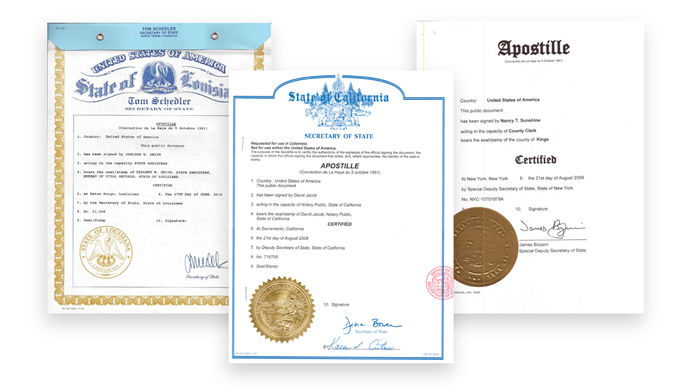Apostille Providers Houston TX: Guaranteeing Record Authentication
Wiki Article
Introducing the Important Role of Apostille in Simplifying International Document Recognition Processes
In the world of international events, the validation of records holds extremely important importance. By affixing an apostille to a document, it goes through a simplified validation that is recognized across countless countries, thus alleviating the problems connected with cross-border file authentication.Comprehending Apostille Fundamentals
In the world of paper recognition for international use, comprehending the basic concepts of apostille verification is critical. An apostille is a specific certificate that verifies the authenticity of a file for use in international countries that are part of the Hague Apostille Convention.
Apostilles are generally issued for important records such as birth certifications, marital relationship certificates, and scholastic transcripts. The key parts of an apostille consist of the name of the nation where it was released, the name of the person authorizing the file, the ability in which the person signed the paper, the seal or stamp of the releasing authority, and the date of issuance. By comprehending these basic elements of apostille authentication, people and organizations can navigate the complexities of worldwide paper recognition with self-confidence and performance.
Benefits of Apostille for Recognition

Furthermore, the apostille simplifies the confirmation procedure by providing a standardized certification that confirms the credibility of the record, such as birth certifications, marriage licenses, notarized actions, and academic records. This standardized format decreases the risk of denial as a result of unfamiliarity with foreign files, thus improving the efficiency of cross-border purchases.
In addition, the apostille helps in eliminating the need for numerous layers of authentication by government authorities, as the apostille itself signifies the file's legitimacy. This not just accelerates the record validation procedure yet additionally reduces the linked prices and bureaucratic hurdles, making it a economical and practical option for organizations and people taking part in global tasks.
Streamlining Cross-Border Paper Authentication
Simplifying cross-border paper authentication, the apostille removes the need for usually complicated and lengthy validation procedures usually needed when providing files in foreign nations. By affixing an apostille to a paper, the releasing nation certifies the authenticity of the document, making it easily acceptable in various other nations that are part of the Hague Apostille Convention.Furthermore, the apostille system enhances the security and reliability of cross-border document recognition by supplying a clear and worldwide accepted system for verifying the validity of documents. This simplification of authentication refines not just benefits individuals and organizations looking for to operate globally however also promotes smoother communication and cooperation in between countries by ensuring the dependability of shared paperwork.
Significance of Apostille in Legalization

Apostille guarantees that legal papers such as birth certifications, marriage certifications, powers of lawyer, and court documents are identified and accepted in international territories. This is especially crucial in lawful matters such as worldwide fosterings, migration processes, or business deals that entail parties from various nations. The apostille procedure minimizes the bureaucratic difficulties and taxing treatments generally associated with record legalisation, making international transactions a lot more effective and lawfully binding. To conclude, the value of apostille in the legalisation of international files can not be overstated, as it promotes smooth cross-border communications and ensures the legitimacy and credibility of lawful documents.
Apostille Vs. Traditional Recognition Techniques
Contrasting apostille with conventional validation approaches discloses distinctive distinctions in the performance and simpleness of document verification processes for international use. Apostille, as a standard and structured technique established by the Hague Convention, uses a more straightforward technique to confirming documents contrasted to standard methods. Standard recognition procedures typically involve numerous actions, including notarization, certification by federal government authorities, and consular legalization, which can be cumbersome and lengthy.Apostille, on the other hand, streamlines this procedure by accrediting papers with a solitary apostille certification issued by an experienced authority in the country where the record stems (Houston TX Apostille). This certificate is acknowledged by all participant countries of the Hague Convention, removing the demand for more consular office legalisation. Consequently, apostille dramatically reduces the time and initiative required for record validation, making it a preferred selection for organizations and individuals included in international transactions
Verdict
Finally, apostille plays a vital duty in streamlining international record recognition procedures by offering a standardized approach of authentication that is identified across taking part countries. Visit This Link By enhancing the legalisation process, apostille eliminates the requirement for multiple layers of recognition, minimizing time and expenses connected with cross-border record verification. This efficient system advantages people and organizations seeking to use international browse around this site papers for legal functions, ensuring smoother worldwide transactions.By fastening an apostille to a paper, it undertakes a streamlined validation that is recognized across numerous countries, therefore alleviating the problems connected with cross-border document authentication. Simplifying cross-border file verification, the apostille removes the demand for often complex and extensive validation procedures normally called for when presenting records in international countries. By fastening an apostille to a paper, the providing country accredits the authenticity of the paper, making it easily acceptable in other countries that are component of the Hague Apostille Convention. By attaching an apostille to a record, the issuing nation accredits the authenticity of the signature, seal, or stamp on the paper, making it valid for usage in one more participant country of the Hague Apostille Convention without the demand for more legalisation.

Report this wiki page